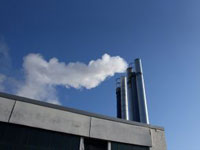Japan Unlikely to Meet Kyoto Protocol Target
 GLOBE-Net - Japan’s greenhouse gas emissions hit a record-high last year, says an annual report released by the Ministry of the Environment. The rise will dampen the country’s obligations set under the international climate change pact known as the Kyoto Protocol.
GLOBE-Net - Japan’s greenhouse gas emissions hit a record-high last year, says an annual report released by the Ministry of the Environment. The rise will dampen the country’s obligations set under the international climate change pact known as the Kyoto Protocol.Emissions of carbon dioxide and greenhouse gases blamed for global warming grew 2.3 percent to 1.37 billion tons in the 2007 fiscal year, writes the Associated Press. Japan is the world’s fifth-largest carbon dioxide producer, behind the United States, China, Russia and India.
The report blames the spike in emissions on the closing of the Kashiwazaki-Kariwa nuclear power plant in northern Japan. In July 2007, an offshore earthquake measuring 6.8 on the Richter scale shook the plant so badly that seismic upgrades are still being installed to prevent radioactive leaks. The report also blamed low rainfall that slowed the hydroelectric sector.
“If the nuclear power plant had been in business as usual, the results wouldn’t have been so bad, though the prospect of meeting our target is still severe,” says Environment Ministry official Mayuko Hattori.
Japan’s nuclear power plants have suffered from safety problems over the years and were operating in 2007 at only 60 percent of their full capacity, says the Associated Press. The country’s utilities have been forced to use more coal, gas and oil to make up for the nuclear power shortfall. This has added million tons of greenhouse gases a year into the atmosphere.
Under the Kyoto Protocol, named after the ancient Japanese capital where the environmental treaty was signed, Japan agreed to reduce its greenhouse gas emissions to 6 percent below 1990 levels between 2008 and 2012. But the target might prove illusory because the country’s total emissions are almost 10 percent above 1990 levels today, says Reuters.
The saving grace lies in a short-term solution – the global economic downturn will help cut carbon emissions as factories drop production. The International Monetary Fund predicts, however, an economic recovery in Japan toward 2012, the last year of the Kyoto commitment.
Under the treaty, countries that are unable to meet targets must buy permits from nations that have a surplus. They can also buy credits representing greenhouse-gas reductions made abroad through investments in clean-energy and forestry projects. Japan has been trading carbon offsets for some time and was the first country to connect to the United Nations’ new carbon-trading system in November 2007. The system officially tracks down carbon credit-related deals.
But trading carbon credits is an admission of failure and pressure will increase on Japan to give up its efforts to control emissions through voluntary measures. It may find itself having to impose tougher limits on industry as is the case in the European Union and Australia. Major Japanese polluters, such as utilities and steel companies, have resisted government emission caps for years, arguing that their go-at-it-alone method helps improve energy efficiency and makes their products more competitive.
What troubles analysts is that Japan’s lack of environmental controls at a time of economic turmoil might convince other countries to stay on the sidelines. If the host of the Kyoto Protocol cannot keep its promises, why should they invest trillions of dollars to stem climate change? Japan may have some explaining to do at a meeting in Copenhagen this December when world delegates establish a post-2012 framework.
You can return to the main Market News page, or press the Back button on your browser.

